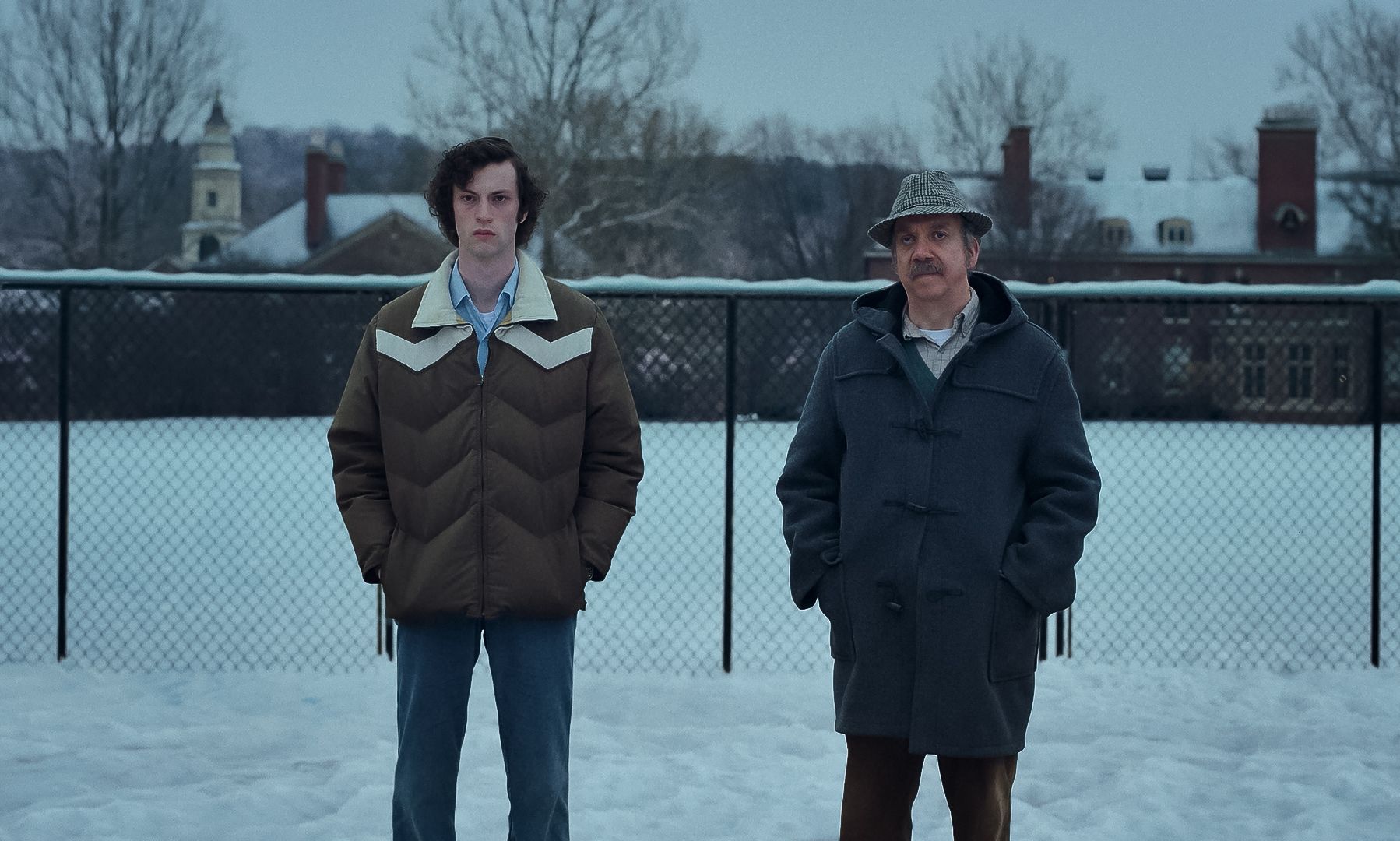
Ornamental Ivies
The Holdovers is the ultimate fable of academic populism.
Paul Hunham (Paul Giamatti) went to Harvard. It’s something he never lets anyone at Barton Academy, the nearby boarding school where he teaches history at the height of the 70s counterculture, forget. He believes himself to be a model of that education, an inspiration to the boys who cycle through his class that they, too, can do anything.
Or at least that’s what he tells himself. His students know that anyone who made it through Harvard wouldn’t end up as a high school teacher (even at a school like this one) without some serious quixotic baggage–a personality trait Paul clearly lacks.
In truth, Paul is a nobody. His reputation is a shield that offers precious little protection. His students already know what they need to because, unlike him, going to an Ivy is part of their birthright. In the end, Paul is the failure he knows he is. And director Alexander Payne spends the next two hours of The Holdovers asking why schools like Harvard get to define the metrics of success for the rest of us.
With the release of his debut film, Citizen Ruth, in 1996, Payne established himself as our most adept cinematic satirist, balancing a distinctly American artistic perspective with an understanding that the underpinnings of how we live now are formed through entrenched bubbles and carefully coiffed self-righteousness. At the same time, Payne is a filmmaker who fully believes in his characters, his movies going to great lengths to never let us forget that, despite their most despicable actions, they remain painfully human.
One may hate Matthew Broderick’s high school teacher in Election for his misguided obsession with revenge against Reese Witherspoon’s Hillaryesque teen overachiever, but he constantly invites us to grapple with our own unhealthy, illogical pursuits as do Payne's middle-aged aspirants in Sideways with their embarrassing forays into the arts. True, too, for the families at the center of The Descendants, About Schmidt, and Nebraska.
Like these films before it, The Holdovers also seems destined for glory this awards season. Payne will not win his third screenplay Oscar (this is the first film he’s made he didn’t at least co-write), but Giamatti and his co-star, Da’Vine Joy Randolph, walked away with Golden Globes for their performances last weekend. However, unlike the majority of awards contenders that lap up attention for three months before effortlessly fading deep into streaming menus, Payne’s films are not pat lip service to issues du jour. They attempt to replicate the messiness of the American experiment while reminding us of our own foibles.
What separates Payne from his contemporaries is his unwavering dedication to Midwestern sensibilities. He may have made the dutiful pilgrimage to California in his youth, but he remains rooted in his hometown of Omaha, an active member of the community who kept the city’s independent movie theater afloat during rough times. Payne has never been guilty of the sins so common among the reverse carpetbaggers who can only hide their contempt for their hometowns when exploiting deplorables’ stories to further their careers. He has maintained an uneasy alliance with the elite that has allowed him to become an astute critic of the “flyover state” pipeline that empties out onto the coasts.
While The Holdovers is set worlds away from Omaha, Payne’s training in local color shines through in his examination of the Massachusetts beyond Harvard Square that only a few films such as this year’s equally outstanding Eileen, have deigned to represent. Thanks to his bitterness and refusal to pass the dunderheaded son of a U.S. Senator dangling a donation check, Giamatti’s Hunham gets left holding the bag as the babysitter for the Barton students not returning home for Christmas break.
With no allies except for school kitchen manager Mary (Randolph), Hunham keeps his charges on a rigorous schedule meant to counteract the natural connections that form from such one-on-one time together. But when Hunham learns about the family situation of one of his more promising students (Dominic Sessa), he must navigate coming to terms with his own life’s failures while embracing the responsibility that comes with being a teacher.
The film’s premise may seem indistinguishable from most inspiring holiday movie fare, but Payne understands that character is the key to probing the universal truths needed to pull off a story like this. It’s one of the reasons he’s reteamed with Sideways star Giamatti. What makes The Holdovers work is the keen anthropological lens Payne has cultivated over the last three decades.
It’s a film about personal and professional veneers that serve as barriers to understanding. And Payne relishes watching them crumble under his satirical watch, whether making a joke out of the ritzy Barton’s administrators reselling their Christmas tree after their final assembly to save money or Hunham leaning hard into his time at Harvard despite that the elite apparatus has long sabotaged his working-class dreams even after accepting him within its ranks.
In the end, The Holdovers is a tale about local people caught up in systems not made for them–the systems that take great pains to honor equity while willfully preventing it from taking root. Mary’s son was smart enough to get into Harvard, one of Barton’s best and brightest. But he died in Vietnam, a war planned by alumni of schools like Barton after their stints at the Ivies. All that’s left are platitudes mumbled by the school’s leaders at formal events and a mother’s unabated grief.
For the past few years, the flyover residents have been told from on high that the universal is impossible, that we’re doing it wrong. As Payne’s film proves, our pain is connected. So are our thwarted ambitions. But it’s in the best interest of the powers that be to keep telling us otherwise.
The Holdovers is now playing in theaters and streaming on Peacock.
